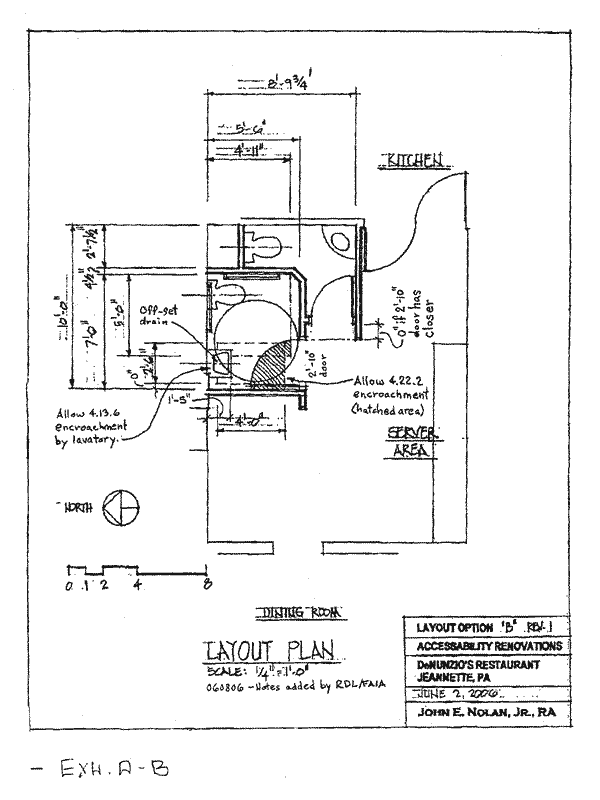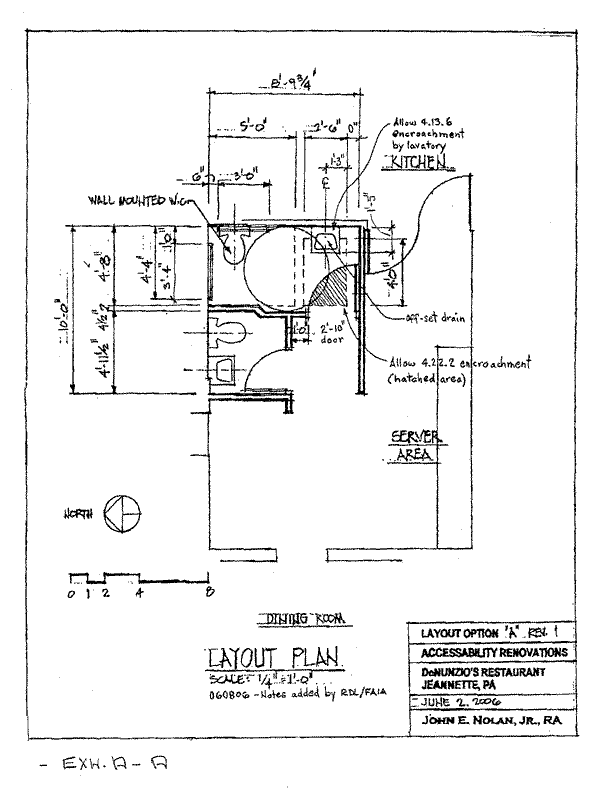|
UNITED STATES DISTRICT COURT
WESTERN DISTRICT OF PENNSYLVANIA
THE UNITED STATES OF AMERICA,
Plaintiff,
DENUNZIO’S RESTAURANT, INC.,
and RONALD DENUNZIO,
Defendants.
__________________________________________
|
)
)
)
)
)
)
)
)
)
)
)
|
Magistrate Judge Robert Mitchell
Civil Action No. 2:05-cv-932
|
CONSENT DECREE AND FINAL JUDGMENT
I. Introduction
This matter is before the Court for entry of this judgment by consent of the United States, DeNunzio’s Restaurant, Inc. and Ronald DeNunzio to effectuate a compromise and settlement of
all claims in the above-captioned civil action. After review and consideration, the Court believes
that entry of this judgment is in the interest of justice.
This Consent Decree ("Decree") resolves a civil action for declaratory, injunctive, and
monetary relief to enforce the provisions of title III of the Americans with Disabilities Act of
1990 (“title III” and “ADA”), 42 U.S.C. §§ 12181-12189. The United States alleges that
defendants violated the ADA by failing to remove certain physical barriers at DeNunzio’s
Restaurant in Jeannette, Pennsylvania.
As a result of ongoing discussions, the United States, DeNunzio’s Restaurant, Inc., and
Ronald DeNunzio have reached agreement that it is in the parties’ best interest, and the United
States believes that it is in the public interest, to resolve this lawsuit on mutually agreeable terms
without further litigation.
In resolution of this action, the parties hereby AGREE and the Court expressly
APPROVES, ENTERS, AND ORDERS THE FOLLOWING:
JURISDICTION AND VENUE
- This Court has jurisdiction over this action under 42 U.S.C. § 12188(b)(1)(B) and 28 U.S.C. §§ 1331 and 1345. This Court has authority to grant declaratory and equitable relief, damages and civil penalties under 42 U.S.C. § 12188(b)(2) and 28 U.S.C. §§ 2201 and 2202.
- Venue is proper in this District pursuant to 28 U.S.C. § 1391 because the defendant DeNunzio’s Restaurant, Inc.’s principal place of business is within this District, Ronald DeNunzio resides in this District and all of the unlawful conduct alleged herein occurred in this District.
- The Attorney General is authorized under Title III of the ADA to bring suit on behalf of the United States if he has reasonable cause to believe that an entity is engaged in a pattern or practice of discrimination under Title III, or that persons with disabilities have been discriminated against under Title III and this discrimination raises issues of general public importance. 42 U.S.C. § 12188(b)(1)(B).
TERMS OF SETTLEMENT
- Defendants agree not to discriminate against any patron with a disability, including those who use wheelchairs, with regard to providing services at DeNunzio’s Restaurant in Jeannette, Pennsylvania.
- Effective immediately, Defendants will take the following steps to remove physical barriers and to otherwise provide all their services to individuals with disabilities:
- Defendants have constructed a ramp along the Lowry Street entrance, which provides access through a door leading into the dining room. During hours that the restaurant is open, defendants will ensure that the door is unlocked to enable customers to enter the restaurant. A sign will be posted at the main entrance on Broad Street directing customers to the accessible entrance.
- Locate the hostess station so that it is adjacent to the step leading into the dining room.
- Convert the current women’s restroom into two single-user restrooms, one of which will be a unisex restroom designed in accordance with either of the drawings, attached hereto as Exhibit A, and the ADA standards, 28 C.F.R. part 36, section 4.16, 4.19, 4.22. Construction will not commence until the Department of Justice has certified in writing that the design complies with the ADA. Signs will be posted directing customers to the accessible restroom.
- Install one accessible parking space, including parking aisle, in the DeNunzio’s Restaurant parking lot, in the space closest to the entrance, in accordance with the ADA standards, 28 C.F.R. part 36 section 4.6.
- Modify existing practices so that if a customer seeks to reserve the upstairs dining room for a private party that includes an individual who uses a wheelchair, the Restaurant will hold the party in one of the downstairs dining rooms under the same terms and conditions.
- Install a television set in the second dining room, so that the area can serve as an alternative space to wait for a table or watch television programs while drinking or eating.
- The remediations described in paragraph 5 will be deemed complete when the United States, upon inspection, certifies that the remediations are in compliance with the ADA standards, 28 C.F.R. part 36. Defendants shall correct any aspects of their construction or modifications set forth in paragraph 5, that are determined by the Department of Justice not to comply with the ADA.
Civil Penalty
- If Defendants fail to complete the remediations described in paragraphs 5 and 6, by November 30, 2006, Defendants will pay the United States $500 per day as a civil penalty, effective December 1, 2006, with a cap of $55,000.
Reporting Requirements and Enforcement
- The United States may review compliance with this Decree at any time and may enforce this Decree if the United States believes that it or any requirement thereof has been violated. If the United States believes that this Decree or any portion thereof has been violated, it will raise its concern(s) with Defendants and the parties will attempt to resolve the concern(s) in good faith. The United States will give Defendants thirty (30) days from the date it notifies the City of any breach of this Decree to cure that breach prior to instituting any court action. Nothing in this paragraph alters the terms under which a civil penalty will be imposed, as described in paragraph 7.
- Failure by the United States to enforce any provision or deadline of this Decree shall not be construed as a waiver of the right to enforce other provisions or deadlines of this Decree.
- This Consent Decree shall remain in effect for two years from the effective date. The United States may petition the Court, at any time during the duration of this Consent Decree, to reopen the case for the purpose of enforcing the Decree, and the Court shall retain jurisdiction to enforce this Consent Decree. This decree will expire without further order from the Court two years from the date of entry and approval.
- The effective date of this Decree is the date on which the Court enters this Decree.
- This Decree shall be binding on the Defendant, its agents and employees. In the event defendants seek to transfer or assign all or part of their interest in DeNunzio’s Restaurant in Jeannette, Pennsylvania, and the successor assign intends to carry on the same or similar use of the facility, as a condition of sale, defendants shall obtain the written accession of the successor or assign to any obligations remaining under this agreement for the remaining term of this Consent Decree.
- This Decree constitutes the entire agreement among the parties relating to United States v. DeNunzio’s Restaurant Inc. and Ronald DeNunzio, Civil Action No. 2:05-cv-932 (W.D. Pa.), and Department of Justice No. 202-64-41, and no other statement, promise, or agreement, either written or oral, made by any party or agents of any party that is not contained in this written Decree, including its attachments, shall be enforceable. This Decree does not purport to remedy any other potential violations of the ADA or any other federal law, and nothing in this Decree shall preclude the United States from filing a separate action under the ADA for any alleged violation not covered by this Decree. This Decree does not affect Defendants’ continuing responsibility to comply with all aspects of the ADA.
- The individuals signing this Decree represent that they are authorized to bind the parties to this Decree.
SO ORDERED this 23rd day of August , 2006.
________________________
Robert Mitchell
United States Magistrate Judge
Western District of Pennsylvania
|
| AGREED AND CONSENTED TO: |
FOR THE UNITED STATES:
ALBERTO R. GONZALES
Attorney General
WAN J. KIM
Assistant Attorney General
Civil Rights Division
MARY BETH BUCHANAN
United States Attorney
Western District of Pennsylvania
633 U.S. Post Office and Courthouse
700 Grant Street
Pittsburgh, PA 15219
JOHN L. WODATCH, Chief
PHILIP L. BREEN, Special Legal Counsel
ALLISON J. NICHOL, Deputy Chief
Disability Rights Section
Civil Rights Division
s/ Laura F. Einstein
LAURA F. EINSTEIN, DC 335380, Trial Attorney
FELICIA L. SADLER, Trial Attorney
Civil Rights Division - Disability Rights Section
United States Department of Justice
950 Pennsylvania Avenue NW - NYA
Washington, DC 20530
202-514-9583 (phone)
202-616-6862 (fax)
Laura.Einstein@udoj.gov
FOR DENUNZIO’S RESTAURANT, INC. AND
RONALD DENUNZIO:
s/ John F. Cambest
John F. Cambest PA ID No. 20134
Dodaro, Cambest & Associates, P.C.
1001 Ardmore Boulevard, Suite 1000
Pittsburgh, PA 15221
Tel: 412-243-1600
Fax: 412-243-1643
office@dodarocambest.com
s/ Ronald DeNunzio
RONALD DENUNZIO
700 Lowry Avenue
Jeannette, PA 15644 |


Cases & Matters by ADA Title Coverage | Legal Documents by Type & Date | archive.ADA.gov Home Page
April 16, 2007
|

